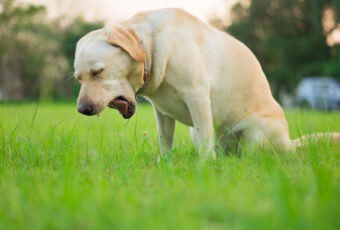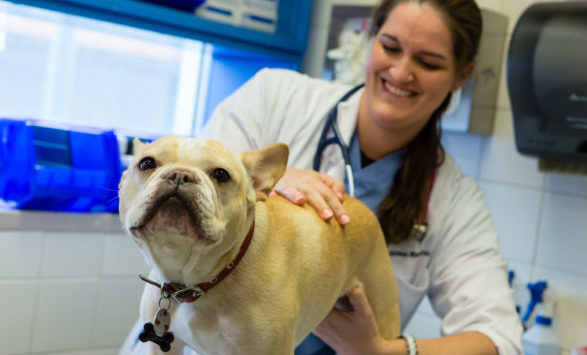Coughing in Pets

Background
A cough is a reflex that induces a forceful exhalation of air from the lungs in order to clear the airways. There are multiple ways to describe a cough (dry or moist, short or harsh, faint or deep, honking) and it can be followed by swallowing, gagging, retching, noisy breathing, or difficulty breathing. There are a wide variety of conditions that can cause a cough.
Possible Causes
There are many reasons a dog may cough, ranging from something mild to a more serious illness. Here are some of the more common causes:
- Allergies Allergens are substances that, when inhaled, ingested, or absorbed into the body, stimulate the immune system, resulting in inflammation. Pets can have allergies to substances in the air or in food.
- Asthma Asthma is a common cause of coughing in cats due to inflammation of the airways. Other signs usually include wheezing and an increased respiratory rate.
- Cancer or a tumor in the larynx lung or airways Cancer is a disease in which abnormal cells grow and reproduce, often in a mass called a tumor. These abnormal cells have the ability to spread to surrounding tissues or other areas in the body.
- Foreign Body A foreign body is any object that is not meant to be inside the body. A foreign body stuck in the throat, windpipe or lungs may cause coughing.
- Gastroesophageal reflux Gastroesophageal reflux occurs when stomach contents flow back into the esophagus.
- Heartworm disease Heartworms, spread through mosquito bites, are parasites that can live in the heart, lungs, and blood vessels of an animal. Common signs of heartworm disease include coughing, difficulty breathing, and difficulty exercising.
- Infection in the voice box (larynx), windpipe (trachea), or lungs
- Kennel Cough Inflammation of the upper airways, also called tracheobronchitis, results from a variety of infectious agents. Infection is spread through the sneezing and coughing of other dogs.
- Pneumonia Pneumonia refers to inflammation of one or both lungs. It can be caused by a virus, bacteria, fungus, parasite or by something irritating the tissue in the animal’s lungs like smoke.
- Thrombosis or Embolism Thrombosis is the formation of a blood clot. An embolism is when the clot obstructs blood flow within a vessel. Coughing may be a sign of a blood clot in the lung.
- Tracheal Collapse Tracheal collapse is a condition in which the animal’s trachea, or windpipe, collapses and causes breathing problems. Pets with tracheal collapse will often show signs of a chronic, honking cough.
- Trauma Collar pulling can put pressure on the neck that may result in a cough. For example, in dogs with tracheal collapse, pulling on their collar puts extra stress on the windpipe and can provoke a severe coughing episode.
Diagnosis
If your pet has difficulty breathing or is coughing excessively, take him to a veterinary ER right away. You should also make an appointment with your veterinarian if:
- The cough lasts more than a week or worsens
- Your pet seems extra tired
- Your pet isn’t eating
- Your pet has a fever
Your veterinarian will examine your pet and run tests to find out if the problem is due to a virus, an infection, allergies, or a different problem. The treatment will depend on the cause.
Treatment
Successfully managing a cough requires treatment of the underlying condition or disease.
- If your veterinarian suspects an infection, your pet may be prescribed an antibiotic.
- For allergies, your pet may be prescribed an antihistamine, anti-inflammatory, or specialized allergy medications to reduce inflammation.
- If appropriate, your veterinarian may prescribe medication such as a cough suppressant to make your pet more comfortable, a bronchodilator to open up the lungs, or an expectorant to remove mucus from the lungs.
Prevention
- Coughs caused by infectious viruses such as distemper can be prevented by a vaccination plan starting from when your dog is a puppy. Yearly booster vaccinations will be required. Your dog’s vaccination program also may also include the kennel cough vaccine. This is recommended if you are planning to board your dog in a kennel or take him to doggy day care.
- Regular parasite control is an important part of your pet’s preventive health care program to guard against infection from internal and external parasites.
- Routine health checks, often carried out at the time of your dog’s annual vaccination can help pick up any underlying medical issues, which otherwise may go unnoticed.
- Keeping your dog’s weight within a normal range can help reduce the risk of your pet developing a disease or condition that may result in coughing.
- To prevent foreign body ingestion, be sure sure to keep any dangerous items which your dog may be tempted to chew or swallow well out of reach.
Make an Appointment































